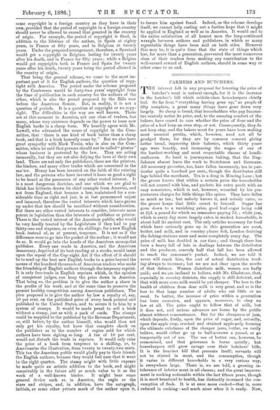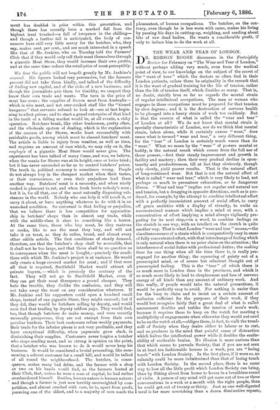FARMERS AND BUTCHERS.
THE interest felt in any proposal for lowering the price of butcher's meat is natural enough, for it is the increase in the butcher's bill which middle-class housekeepers chiefly feel. So far from "everything having gone up," as people of fifty complain, a great many things have gone down very largely. So cheap is bread, that householders who pay Income- tax scarcely notice its price, and, to the amazing comfort of the bakers, have ceased to care whether the price of flour and the price of a loaf keep an even step, or not. Consequently, they do not keep step, and the bakers must for years have been making most unusual profits, which, however, need not all be grudged them, for they are by common consent giving better bread, improving their bakeries, which thirty years ago were beastly, and increasing the wages of one of the hardest-working and most respectable classes of handi- craftsmen. So hard is journeyman baking, that the Eng- lishmen almost leave the work to Scotchmen and Germane. All necessary groceries, too, have fallen immensely, tea in par- ticular quite a hundred per cent., though the distributor still lags behind the merchant. Tea is a drug in Mincing Lane ; but the grocer knows that within a certain price the householder will not quarrel with him, and pockets his extra profit with an easy conscience, which is not, however, wounded by his pre- posterous charges for little things like spices. They have fallen as much as tea ; but nobody knows it, and nobody cares, so the grocer keeps that little secret to himself. Sugar has gone down to a vanishing price, good loaf.sugar being sold at 21d. a pound for which we remember paying 7d. ; while jam, which is every day more largely eaten in modest households, is about half its ancient cost. The only articles necessary for food which have seriously gone up in this generation are meat, butter, and milk, and in country places fish, London draining the fishing-stations more and more completely every day. The price of milk has doubled in our time ; and though there has been a heavy fall of late in dealings between the distributor and the producer, scarcely half that fall has been allowed to reach the consumer's pocket. Indeed, we are told it never will reach him, the cost of actual distribution tend- ing always to increase ; but we are not clear upon the merits of that defence. Women distribute milk, women are badly paid ; and we are inclined to believe, with Mr. Gladstone, that, especially in country districts, the supply is still deficient, and that with more cows milk would be yet cheaper. The loss to the health of children from dear milk is very great, and so is the loss to that large number of adults who eat little or no meat. In batter, the increase of price within a generation has been excessive, and appears, moreover, to obey no law at all. The price ought to follow that of milk, but it does not, and serious advances are borne by the public almost without remonstrance. But for the cheapness of jam, which depends, firstly, upon the price of sugar, and, secondly, upon the apple crop, crushed and strained apple-pulp forming the ultimate substance of the cheaper jams, butter, we verily believe, would either go up to half-a-crown a pound, or go temporarily out of use. The use of butter can, however, be economised, and that grievance is borne quietly ; but housekeepers still grow savage over their butchers' bills. It is the heaviest bill that presents itself; servants will not be stinted in meat., and the consumption, though it varies in different households in a very curious way, is everywhere large. There is, we are told, a growing in- tolerance of inferior meat in all classes; and the great improve- ment in cooking noticeable within the last fifteen years, though it is most beneficial to health, has distinctly increased the con- sumption of flesh. It is at once more cooked—that is, more reduced in cooking—and much nicer when it is ready. Now, meat has doubled in price within this generation, and though there has recently been a marked fall from the highest level touched—a fall of twopence in the shilling— and though a further fall is anticipated, the body of con- sumers have still very little mercy for the butcher, who, they say, makes cent. per cent., and are much interested in a speech like that of Mr. Jenkins, who on Tuesday told the Farmers' Club that if they would only sell their meat themselves through a gigantic Meat Store, they would increase their own profits, and at the same time reduce the retail price of meat perceptibly.
We fear the public will not benefit greatly by Mr. Jenkins's counsel. His figures looked very persuasive, but the farmers present did not take them kindly, and talked of the difficulty of finding new capital, and of the risks of a new business; and though the journalists quiz them for timidity, we suspect they know their own trade and wants. The turn in the price of meat has come ; the supplies of frozen meat from Australia— which is nice meat, and not over-cooked stuff like the "tinned kangaroo" that servants refused to look at—are at last begin- ning to affect prices ; and to start a grand enterprise of that kind in the teeth of a falling market would be, at all events, a risky operation. Butchers break, like other tradesmen, pretty often, and the wholesale system of dealing, which is the explanation of the success of the Stores, works least successfully with perishable goods, among which must be classed butchers' meat. The article is liable to injury from weather, as well as time, and requires an amount of care which, we may rely on it, the employes of a gigantic Meat Store would never give. The experiment has been talked of many times, and was, we believe, when the mania for Stores was at its height, once or twice tried ; but it has never succeeded so far as to control butchers' prices. The truth is, political economy is sometimes wrong. People do not always buy in the cheapest market when their tastes, or their convenience, or even their prejudices lead them another way. Butchers' meat is a necessity, and when nicely cooked is pleasant to eat, and when fresh hurts nobody's nose ; but it is, for all that, one of the most naturally disgusting sub- stances in the world. Nobody who can help it will touch it, or carry it about, or have anything whatever to do with it in an un000ked condition. So universal is that feeling or prejudice, that we believe there is less competition for apprentice- ship in butchers' shops than in almost any trade, while with the middle-class it rises to something like a horror. At the same time, those who buy meat, be they matrons or cooks, like to see the meat they buy, and will not take it on trust, as they do coffee, bread, and almost every other edible article. The first conditions of steady demand, therefore, are that the butcher's shop shall be accessible, that it shall not be too large, and that there shall be no question as to conveyance when the meat is bought,—precisely the condi- tion', with which Mr. Jenkins's project is at variance. He would only create a huge covered market for meat ; and if that were all that is required, Smithfield Market would attract all private buyers,—which is precisely the contrary of the fact. They will not go to Smithfield Market, even if they can get their meat threepence a pound cheaper. They hate the trouble, they dislike the confusion, and they will not take away the meat on any consideration whatever. If Mr. Jenkins and his supporters could open a hundred small shops, instead of one gigantic Store, they might succeed ; but if they did, they would be butchers selling by deputy, and would soon find that trading by deputy seldom pays. They would find, too, that though butchers do make money, and were recently unusually prosperous, they are not exempt from their own peculiar burdens. Their best customers refuse weekly payments, their trade for the inferior pieces is not very profitable, and they have exceptional difficulty, when payments grow slack, in diminishing their supplies. Customers never forgive a butcher who stops sending meat, and so strong is opinion on the point, that a butcher who was known to do it would never keep his business. It would be considered a brutal proceeding, like sum- moning a solvent customer for a small bill, and would be talked of all round the neighbourhood. The butcher, in conse- quence, makes many bad debts, and the farmer with a shop or two on his hands would find, as the farmers hinted at their Club, that, unless he were a man of capital, he had rather overburdened himself. Besides, human nature is human nature ; and though a farmer is just now terribly overweighted by com- petition, and almost crushed with care, he is, apart from profit, pursuing one of the oldest, and to a majority of men much the
pleasantest, of human occupations. The butcher, on the con- trary, even though he is less worn with cares, makes his living by passing his days in cutting-up, weighing, and sending about bits of raw dead bodies. He wants a considerable profit, if only to induce him to do the work at all.















































 Previous page
Previous page